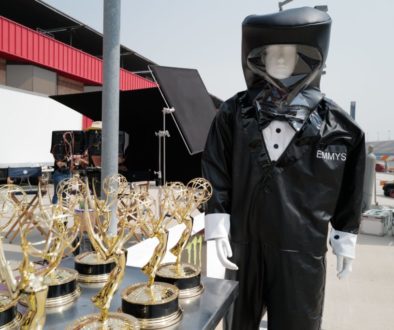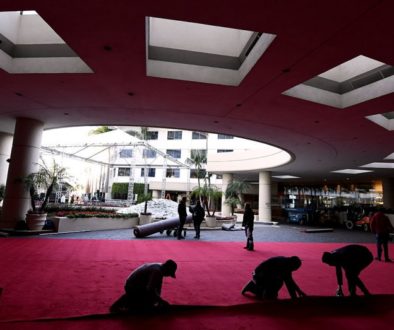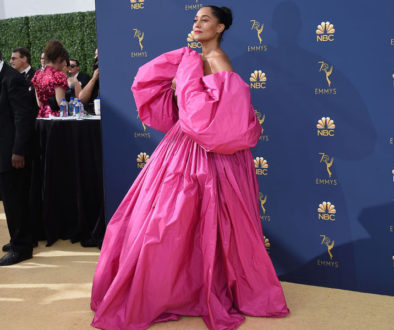The Hour
Season 2 of The Hour premiered in the US last night! I want to talk about it, but to talk about Season 2, you have to talk about Season 1. Let’s do that. (Mild spoilers for Season 1, obviously.)
**
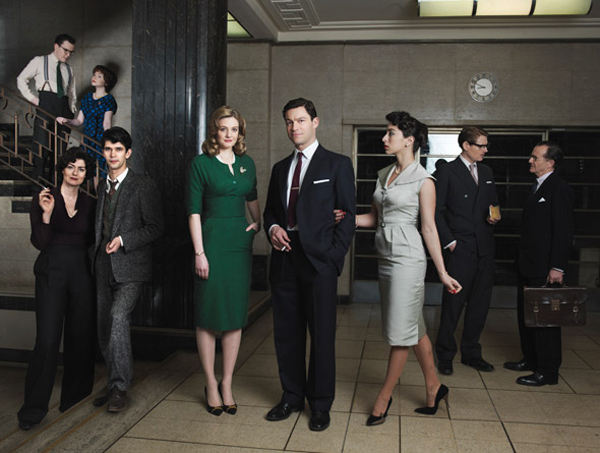
The Hour loves its puzzles.
There’s the investigative puzzle-piecing of a political thriller: on a large scale, newsmagazine The Hour covers the burgeoning Suez Crisis; on a smaller one, there’s a mole in the BBC with their eyes fixed on the fledging show. There are the half-spoken dialogues of a character drama: between quasi-romantic leads Bel and Freddie, among colleagues who have too much to lose if the show goes under. And there are the moving parts that must fit in order to make television, which frames the logistics of producing a live weekly news hour on the BBC in 1956, with its attendant postwar complications around censorship and journalistic ethics.
But crosswords are the show’s emblem. They make up the entirety of the opening credits, they embody the show’s subtext that everything fits together but doesn’t make a whole, and they’re the marker that one of its heroes, reporter Freddie Lyon, is at a turning point.
In one such moment, Freddie sits in a club beside partner-in-crime and yearnee Bel Rowley, as golden-boy anchor Hector chats up a general they hope to snag for the air. Hector’s looking at the mark; Bel’s looking at Hector; Freddie’s looking at Bel. In his hands is a crossword puzzle. The words he’s solved for: “Atom, shamble, evolve.”
It is, in its own way, a tidy summation of the show, which is at its best in grace notes, in moments of despair, abandon, or falling apart, and in the undercurrent of change that affects everything – and everyone – making the news the news.
The background action includes international and domestic politics, hampered in the reporting by government policies, questionable showrunner ethics, and ongoing debates about the definition of balanced news. Alongside the production plot runs a murder mystery that at first seems unconnected to The Hour but has points of contact that are more than coincidence, and the quest to discover why the death of a socialite who once knew Freddie keeps coming so close to home.
While the machinations are compelling, and Freddie’s investigation grows tense, the show is primarily concerned with characters, and those expecting high-speed plot twists might find themselves wishing for more. (These plots unfold, not race.) However, that doesn’t mean the show is dull – there’s enough to be intriguing and thrilling at suitable intervals, and by the last episode, when everything bears out during a live broadcast, is largely a nail-biter.
Undoubtedly, though, the centerpiece of the show is the characters, rendered expertly by the truly amazing ensemble. (Ben Whishaw, Romola Garai, Dominic West, and Anna Chancellor are exceptional, but there’s honestly not a dull performance in the bunch, and whenever supporters like Oona Chaplin as Hector’s beleaguered wife Marnie and Anton Lesser as showrunner Clarence get handed a scene, they race off with it in style.)
In fact, the cast smoothes over many of the rough spots that might otherwise plague the show. Given the background realism, some espionage subplots and societal shortcuts are a little speculative. Bel and Freddie in particular seem often to be fantasy characters against the workaday experience of everyone else. Bel snags Producer without more than a raised eyebrow from anyone about her gender, youth, or inexperience, at the BBC in 1956 – quite a coup – and Freddie’s pursuit of the murder that falls in his lap often relies on people taking a look at him and deciding to fess up. However, Garai and Whishaw do master-class work; Bel is a complicated character of the sort that often blunders and makes bad calls, but Garai keeps her compelling; Whishaw makes sure Freddie has a deep conviction that makes it (at least in the moment) plausible that he’d find the right people and convince them he should be trusted with the truth.
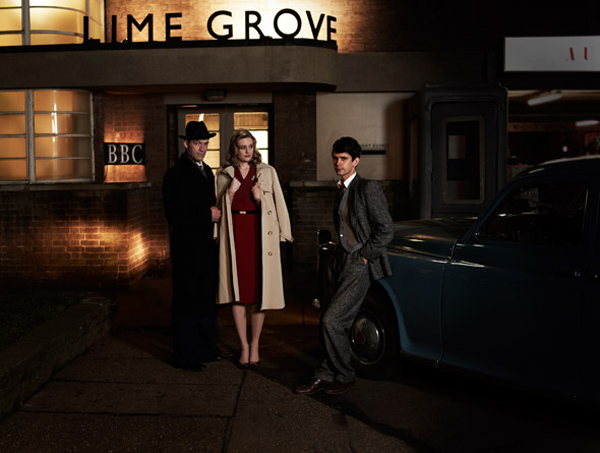
Hector, an unexpected addition to their two-person social circle, sharpens their relationship by being a simultaneous compliment and foil to both. On the air, he’s a commanding presence, but his ambitions mean there’s tension just at the edge of the frame. Socially clawing through the tony set that amuses them, intellectually awkward against their endless repartee, he’s out for himself and drawn in to their ideals almost despite his better judgment; he’s married and cheating with the emotion-avoidant Bel, and he’s veteran of a war during which Freddie was a child avoiding the Blitz.
The stage seems set for a love triangle – except Bel and Hector aren’t in love, just running from the alternative (and know it), and Hector and Freddie’s relationship grows with equal depth. Freddie and Bel also avoid the majority of Nice Guy Syndrome pitfalls by virtue of Garai and Whishaw committing to the cowardly, selfish aspects of their too-close friendship: this show knows that people who call each other James Bond and Moneypenny in 1956 are probably a little insufferable, and definitely trying to say something else. (They know that, too. When, in a private moment, Freddie quotes the e.e.cummings love poem he once sent Bel, there’s no bravery on his side, and no shock on hers; it’s just an old news story neither of them has the courage to air.)
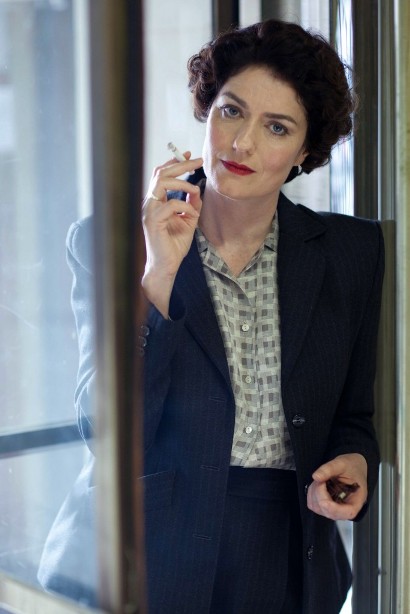 Interestingly, none of them is the real embodiment of The Hour itself. That belongs to Lix Storm, seasoned photographer and foreign-desk agent who’s spent a life making news, and during the season becomes, one scene at a time, the accidental thematic heart of the show. Unrelentingly pragmatic, tossing one-liners to obfuscate any inconvenient emotions, negotiating the newsdesk while coaxing information from sources in a single bound, she’s some facet of the Platonic ideal for each of the other three leads, a fact which seems to alternately amuse and depress her.
Interestingly, none of them is the real embodiment of The Hour itself. That belongs to Lix Storm, seasoned photographer and foreign-desk agent who’s spent a life making news, and during the season becomes, one scene at a time, the accidental thematic heart of the show. Unrelentingly pragmatic, tossing one-liners to obfuscate any inconvenient emotions, negotiating the newsdesk while coaxing information from sources in a single bound, she’s some facet of the Platonic ideal for each of the other three leads, a fact which seems to alternately amuse and depress her.
And her standout scene from the first season isn’t with Freddie (who slept with her in a halfhearted attempt at connection) or Bel (the recipient of so-dry-it-burns mentorship), the nominal leads, but Hector, who’s beginning to realize the stakes of speaking truth to power when you’re the mouthpiece.
He examines Lix’s office; she explains, determined and detached, the photo of a stricken woman and the husband being executed behind her. “I couldn’t find another film,” she says. “They were being shot one by one and all I could think was: got no bloody film.”
He looks at her in shock; she says, “I’m still glad I got it. Got to grab it while you can.” After waiting for a crack in the façade, Hector realizes there is no façade; as he watches her, we see him silently stare into the alternate futures of giving up his big break, or becoming someone whose life has burned out in search of stories. (Atom, shamble, evolve.)
In many ways, this scene serves both as bookend and exemplar. It’s two characters crossing at a point without quite reaching understanding; it’s a small conversation that says worlds more. And without either lead, in a quiet moment far from the airwaves, it’s the moment that crystallizes the first season of what turns out to be a largely satisfying puzzle.

